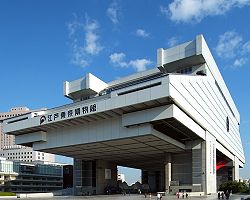Kiyonori Kikutake

Kiyonori Kikutake (菊竹 清訓, Kikutake Kiyonori) (April 1, 1928 – December 26, 2011) was a prominent Japanese architect known as one of the founders of the Japanese Metabolist group.[1] He was also the tutor and employer of several important Japanese architects, such as Toyo Ito, Shōzō Uchii and Itsuko Hasegawa.
Background
Kikutake was born in 1928 in Kurume, Japan and graduated from Waseda University in 1950.[2]
Career
Kikutake is best known for his "Marine City" project of 1958, which formed part of the Metabolist Manifesto launched at the World Design Conference in Tokyo in 1960 under the leadership of Kenzo Tange. He, along with fellow member Kisho Kurokawa was invited to exhibit work at the "Visionary Architecture" exhibition in New York of 1961, through which the Metabolists gained international recognition. Kikutake continued his practice until his death in 2011, producing several key public buildings throughout Japan, as well as lecturing internationally. He was also the President and then Honorary President of the Japan Institute of Architects. Kikutake often collaborated with the prominent Japanese structural engineer Gengo Matsui. Starting from the early 1950s, they worked together on the design of more than 40 buildings, including on well-known projects like the Sky House, Hotel Tōkōen, Toku’un-ji Temple Ossuary, and the Hagi Civic Hall. [3]
Awards
Kikutake was the recipient of numerous awards both in his native Japan and internationally. These include the Japan Academy of Architecture Prize (1970) and the UIA (Union Internationale des Architectes) Auguste Perret Prize (1978).
List of works
- Sky House, Tokyo, 1958
- Marine City (proposal), 1958
- Tatebayashi Civic Centre, Gumma, 1963
- Administrative building of Izumo Shrine, Shimane, 1963
- Pacific Hotel Chigasaki, Kanagawa, 1966
- Miyakonojo Civic Hall, Miyazaki, 1966
- Expo Tower, Expo '70, Osaka, 1969
- Pasadena Heights, 1975
- Matsumi Tower, Ibaraki, 1976
- Tanabe Art Museum, Shimane, 1979
- Hotel Seiyo Ginza, Tokyo, 1987
- Edo-Tokyo Museum, Tokyo, 1993
- Hotel Sofitel Tokyo, Tokyo, 1994
- Kitaya Inari Shrine, Tokyo, 1997
- Shimane Art Museum, Shimane, 1999
- National Showa Memorial Museum, Tokyo, 1999
- Kyushu National Museum, Fukuoka, 2005
- Tatebayashi Civic Centre, 1963
- Administrative building of Izumo Shrine, 1963
- Miyakonojo Civic Hall, 1966
- Osaka Expo Tower, 1970
- Matsumi Tower, 1976
- Hotel Seiyo Ginza, 1987
- Edo-Tokyo Museum, 1993
- Hotel Sofitel Tokyo, 1994
- Kitaya Inari Shrine, 1997
References
- ^ 日本を代表する建築家、菊竹清訓氏が死去 83歳 建築運動「メタボリズム」をリード (in Japanese). MSN. 2012-01-05. Archived from the original on 30 April 2012. Retrieved 5 January 2012.
- ^ "Kiyonori Kikutake". Encyclopædia Britannica Online. Retrieved 5 January 2012.
- ^ Matsui, Gengo (1991). Structural Design in Japanese Architecture Gengo Matsui Works 1955-1989.
- Kisho Kurokawa, "The Origin and History of the Metabolist Movement" - Charles Jencks, Kisho Kurokawa. Studio Vista, 1976
- Botond Bognar, "Beyond the Bubble: Contemporary Japanese Architecture" ; Phaidon, 2008










